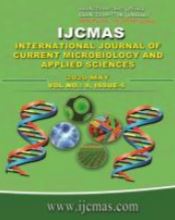


 National Academy of Agricultural Sciences (NAAS)
National Academy of Agricultural Sciences (NAAS)

|
PRINT ISSN : 2319-7692
Online ISSN : 2319-7706 Issues : 12 per year Publisher : Excellent Publishers Email : editorijcmas@gmail.com / submit@ijcmas.com Editor-in-chief: Dr.M.Prakash Index Copernicus ICV 2018: 95.39 NAAS RATING 2020: 5.38 |
The present investigations was carried out to study the effect of hot water seed treatment comprised of different ranges of temperature (47-49, 50-52 and 53-55 °C) and discrete duration of time (30, 45 and 60 min.). The seeds of bell pepper and their most important seed-borne pathogens (Alternaria spp., Curvuleria spp., Penicillium spp., Fusarium spp. Colletotrichum spp.) have been investigated in laboratory. Thee numbers of infected seeds were observed and recorded daily and per cent incidence was evaluated. Furthermore, per cent ungerminated seeds and incidence of various diseases like, damping-off, anthracnose, wilt, cercospora leaf spot and virus attack was recorded in nursery as well as in field under protected cultivation. Under in vitro conditions, the hot water treated seed with temperature 50-52°C for 30 min. showed significantly lower seed microflora (%) as compared to untreated seed (control). In nursery condition, the hot water treated seed, same temperature 50-52°C for 30 minutes showed lower damping-off and virus incidence as compared to control with 22.75 per cent post emergence damping-off and 5.56 per cent respectively. Though, the incidence of damping off and virus attack is minimum in case of the hot water treated seed same temperature 53-55°C for 60 min. i.e. 5.47 per cent and 1.11 per cent respectively but this high temperature for such long time have strongly affected germination. That’s why ungerminated seed percentage in case of is hot water treated with 53-55°C for 60 min. is 41.11 which is significantly very high compared to the hot water treated with 50-52°C for 30 minutes i.e. 12.22 per cent. Under protected condition the hot water treated with 50-52°C for 30 min. showed lower incidence of diseases like anthracnose, cercospora leaf spot, wilt and virus as compared to control. It may be concluded that hot water seed treatment at 50-52°C for 30 min. proved effective in reducing the incidence of diseases like damping–off, anthracnose, cercospora leaf spot and viruses in bell pepper cultivar Solan Bharpur without any ill effect on the germination of seeds.
 |
 |
 |
 |
 |